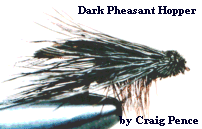Dark Pheasant Hopper

Tied by Craig "Tailwater" Pence, KQKA36A@mail.prodigy.com
PATTERN:
Thread: White uni-thread 8/0 (colored with marking pen)
Hook: Mustad #9671 size 12
Tail: Moose hair
Body: Dark brown medium chenille to match deer hair
Rib: Brown hackle
Wing: "Church window" mottled pheasant feather
Underwing: Dark brown deer hair
Head: Trimmed dark brown deer hair
TYING INSTRUCTIONS:
Tie in 6 to 12 moose hair fibers at bend to form tail. Tie in chenille
and hackle feather (by the butt, convex side facing rear of hook).
Wrap chenille forward to point 1/3 hook shank's length from the eye and
tie off. Plamer hackle forward over chenille, tie in and half-hitch.
Stack and tie in underwing of deer hair tight against chenille body. Do
not allow to spin. Underwing should extend to bend. Half-hitch and
cement. Coat pheasant feather with a little flexament and stroke toward
tip, working the cement into the feather and narrowing it. Stroke for
a few seconds until the cement becomes tacky and takes a set. Allow to
dry before tying in on top of deer hair underwing. The pheasant
feather lays flat over the underwing (ie., parallel to the body instead
of perpendicular), and extends nearly to the end of the tail.. Half-
hitch and cement. Bring thread forward from the wing to a point half
way to the eye. Cut and stack a small bundle of the deer hair, then
tie in on near side of hook. Allow to spin across top of hook and half-
way down far side. Tips of hair should extend to bend. Wrap a few
times under good tension, then pull butts back and wrap in front of the
bundle, making head of fly. Color thread with marking pen, whip finish
and cement.
General Notes:
The pheasant hopper is a pretty quick fly to tie and is very versatile.
It could represent a host of land-locked bugs besides our friend the
grasshopper, and can even be fished with a sinking-tip line, lead or
Xink in lieu of a muddler. You can dead-drift it, twitch it, or skate
it (it does look a little like an elk-hair caddis, doesn't it?); and
does a great job in late summer when all those tasty, accident-prone
bugs are thick in the tall grasses and trees at the water's edge.
BACK TO TFS

